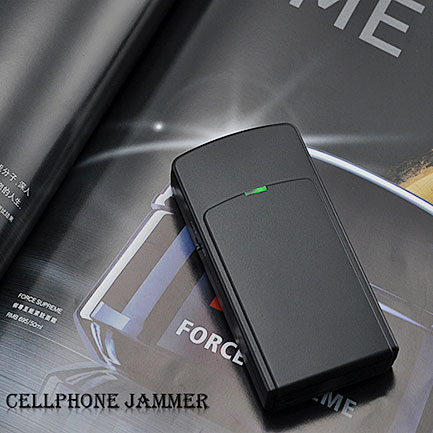2024年11月30日
Handheld Mobile Phone Jammers
At the time of their launch, cell phone zappers offered consumers few alternatives. They were predominantly oversized and unwieldy, posing difficulties for portability since they were larger than standard briefcases.
Currently, you can discover a greater selection of cell phone zappers, many of which are designed to be small enough to hold in the palm of your hand.
One of the notable features of a small phone zapper is its convenience in portability, enabling you to have it on hand at all times. The advantages of this include:
- Have you ever experienced the frustration of standing in line at a fast food restaurant behind an individual who won’t turn off their cell phone and order?
- Have you ever experienced a morning bus journey where you were unable to escape the incessant recounting of a fellow passenger's recent adventures?
- Consider the idea of spending a considerable sum for a movie night, only to be disrupted by another viewer who chooses to narrate the film to his companions over his mobile phone.
Should that be true, you might value the concept of a portable mobile cell phone zapper that you can engage at any time. You will find enjoyment in...
Should that be true, you might value the idea of possessing a portable mobile cell phone zapper that you can turn on whenever you wish. It will bring you satisfaction.
- Instantaneous calm and stillness.
- Enhanced processing speed in lines when you find yourself behind a cell phone user.
Although the variety of small cell phone zappers is not as comprehensive as that of larger models on the market, they are adequately sized to ensure a peaceful atmosphere in your personal space.
Please be advised that many novelty products on the market can cover areas of less than 6 feet for under $100, but this may not be a practical solution.
The most sought-after cell phone blocker we offer is a professional-grade device that encompasses nearly all available bandwidths, delivering coverage of up to 30 feet in ideal circumstances. Feel confident in your purchase; we guarantee the quality of our products.

2024年11月29日
Taking Action on Cell Phone Jammers Prisons
Georgia attorney general asks federal government to take action on cell phone jammers in prisons and jails
The Attorney General, Chris Carr, is pressing the Federal Communications Commission (FCC) to act without delay in allowing the use of cell phone jamming devices in state prisons and local jails. Currently, the FCC's regulations ban the use of cell phone jammers, a restriction that applies to state and local entities. Despite this, contraband cell phones are being used in correctional facilities across the country to orchestrate violent attacks and other criminal endeavors, endangering the safety of correctional personnel, visitors, inmates, and the public.
Carr emphasized, "The most straightforward approach to safeguarding the public from the threats posed by contraband cell phones is to implement cell phone jamming technology in prisons and jails, but the FCC continues to impede our efforts. This outdated directive restricts crucial law enforcement tools, creates hazardous conditions for correctional officers, and enables the proliferation of criminal networks both within and outside prison walls. Our commitment to combating violent crime in all settings compels us to call on the federal government to remove this significant hindrance to public safety."
In Georgia, a total of 8,074 contraband cell phones were seized in 2023, with 5,482 confiscated thus far in 2024. A recent case involved a leader of the infamous "Yves Saint Laurent Squad," who used a contraband phone to order a hit that led to the death of an 88-year-old veteran. In North Carolina, a gang leader was able to arrange the kidnapping of a prosecutor's father using a cell phone from prison. Furthermore, in California, prison gangs have taken advantage of contraband cell phones to orchestrate murders and engage in drug trafficking.
"There are numerous cases throughout the nation showing how inmates can utilize contraband cell phones as dangerous weapons, enabling them to carry on with their criminal enterprises. We are deeply disturbed by the measures these individuals take to persist in their activities and endanger the community," expressed Georgia Department of Corrections Commissioner Tyrone Oliver. "As the methods for smuggling contraband cell phones into our facilities advance, the need for jamming technology becomes critical in our efforts to thwart these attempts. We value the support of Attorney General Carr in our ongoing mission to uphold public safety and maintain the secure operation of our facilities."
In his letter, Carr emphasizes that the FCC's policy is founded on a statute from the early 1990s, which predates the use of contraband cell phones by prison inmates for the purpose of planning and executing illegal and dangerous activities.
Carr further emphasizes that the language of 47 U.S.C § 333 does not inhibit the FCC from modifying its policy to enable state agencies to employ cell phone jamming devices in prisons. In reality, the United States Bureau of Prisons has identified the potential benefits of such signal jammers and is authorized to use them in various federal penitentiaries, including at least one in Georgia.

2024年11月28日
Students Are Utilizing Mobile Phones as a Means to Engage in Academic Dishonesty
A local news report aired yesterday regarding students utilizing their mobile phones to engage in academic dishonesty. My initial response was one of acknowledgment; cheating among students is a longstanding issue. The methods employed for cheating are not particularly novel. Whether it involves inscribing answers on their hands, programming calculators to solve physics problems, accessing Google on their smartphones to consult Wikipedia, or discreetly communicating with peers, students have always found ways to cheat. This is hardly a revelation.
The report focused on a 19-year-old college student who openly admitted to frequently cheating with the aid of his phone, stating, "It’s not a big deal. If the teacher doesn’t notice, what does it matter? I am merely one student among millions in the city, striving for a marginally better grade on an exam."
A different student expressed a sentiment suggesting that since dishonesty and deceit are prevalent in society, there is no reason for them to refrain from similar behavior. They pointed out that athletes frequently resort to performance-enhancing substances, large corporations manipulate financial records and exploit offshore tax shelters, and banks extend credit to individuals who are unlikely to repay. Given the pervasive lack of integrity across various sectors, they questioned why they should not seek to capitalize on every opportunity available to them.
The report highlights an interesting point: it is difficult to imagine that any students refrained from consulting Google during a history examination. Now, they are informed. "Ah, so that was the Union commander at the Battle of Antietam. Thank you, Internet!"
There are several strategies to address mobile phone cheating in educational settings. One effective approach is to prohibit the use of phones within the classroom. While it is likely that some individuals may attempt to bring their devices despite the ban, the majority who comply will make it easier to identify those who do not. Additionally, one might consider acquiring or constructing a cell phone jammer. These devices are relatively accessible and typically cost a few hundred dollars, effectively disabling mobile internet access. However, it is important to note that the legality of cell phone jamming varies, so it is advisable to consult local regulations to avoid potential legal issues.
In summary, students who are inclined to cheat will find ways to do so, whether through the use of a mobile device or a small piece of paper. Educators may choose to encourage honesty among students, although the motivation for such honesty may be questionable. Alternatively, one could consider isolating the classroom environment with a Faraday Cage. Ultimately, one might simply have to accept the current state of affairs.

2024年11月27日
Ukraine Uses Drones and Jammers to Break into Kursk Port
Observers from Russia indicate that Ukraine is proficient in the use of drones and jammers to access the port of Kursk.
Observations from Russian military personnel indicate that the Ukrainian forces have skillfully leveraged drones and jammer device of Russia's Kursk region.
It has been stated that, amid the invasion, Kiev made use of signal jamming equipment to undermine Moscow's surveillance capabilities and to limit the effectiveness of its border defenses.
This provided Ukrainian drone blocker with the opportunity to initiate unforeseen attacks on the ground as soldiers moved into hostile territory.
Military expert Samuel Bendett from Russia indicated that Ukraine's implementation of this tactic was anticipated, given the considerable investment it has made in electronic warfare.
He conveyed to CBC News, "It certainly appears to be possible. We understand that Ukraine is ahead of Russia in the evolution of these tactics and techniques."
Carefully planned
As per information provided by the Institute for the Study of War (ISW), Ukraine has launched attacks on no less than 800 square kilometers (308 square miles) of territory belonging to Russia.
Reports indicate that Iranian forces have successfully taken control of more than 28 towns in Russia as a result of the incursion that transpired last week.
The exact details of the successful offensive have not been communicated by Ukraine, despite some information being leaked to the press.
Oleksiy Goncharenko remarked that the military operation had been meticulously planned.
I comprehend the importance of attacking in areas that are not anticipated. This is the method adopted by the Ukrainian Armed Forces, as he articulated. "Employing fresh tactics and modern technologies certainly offers us a distinct advantage."
Did the drone army succeed?
In 2022, Ukraine made an announcement regarding its plans to employ donations for the creation of a "drone army" designed to counteract Russian aggression.
Furthermore, a dedicated military division for the purpose of drone warfare was established.
The extensive investment in drone capabilities appears to have been advantageous, allowing Kiev to effectively employ its kamikaze drones deep inside Russian territory.
"We are well-equipped to triumph in the war with the Russian Federation," remarked Ivan Havrilyuk, Ukraine's Deputy Defense Minister. "Our resources enable us to replace individuals in the trenches, on the sea, in the air, and underwater."

2024年11月26日
Has Your Doorbell Camera Encountered Any Form of Interference?
Do you possess a doorbell camera at your front door? The probable answer is yes. As smart technology continues to evolve, security devices such as doorbell cameras have become indispensable in many homes. However, in areas with shared driveways in Palmdale, California, and elsewhere, these devices tend to be surprisingly ineffective.
We received a communication from Maureen, who expressed concerns regarding her Ring doorbell camera located in her driveway. She reported that the device consistently failed to record her neighbors and their guests. Despite being optimally positioned and fully powered, the camera seemed incapable of determining why it frequently collided with the wall. This led to a pertinent question: Could the Ring camera be experiencing interference from a signal jammer device?
Research indicates that wireless jammer device have a significant impact on the performance of Ring doorbell cameras. These devices operate by transmitting radio frequency signals that hinder or interrupt the communication between the camera and the receiver, resulting in a temporary loss of functionality. Nevertheless, how can one identify the use of such a device?
How to detect jamming attacks on security cameras using noise levels
The ambient noise levels near a security camera installation may suggest the likelihood of interference. Noise levels are expressed in dBm (decibel milliwatts), with lower readings reflecting minimal noise interference and higher readings denoting greater noise interference.
Utilizing a decibel meter like this can enable homeowners, including Maureen, to detect any irregular activities or changes in noise levels surrounding her cameras that might point to interference.
Unexpected Interference
Located in East Greensboro, North Carolina, Carol guides us through her Ring camera setup, which she has positioned at both of her home's doors to observe and record all occurrences in her surroundings. Unfortunately, it seems that someone has discovered a method to disrupt her internet service, effectively bypassing the surveillance provided by the Ring cameras.
Use a separate network for your devices
Implementing a separate network for devices like Ring cameras can significantly bolster your security. These devices can interact with other devices on the same network, such as laptops, smartphones, or tablets. However, some of these devices may exhibit weak security protocols or vulnerabilities, which could permit hackers to access or control them remotely. Consequently, this could endanger your privacy and data.
To enhance the security of these devices, one effective strategy is to separate them from other networks. This can be achieved by creating an exclusive Wi-Fi network specifically for your internet-connected devices, including your Ring doorbell camera, and restricting any other traffic on this network. Such a measure ensures that malicious entities are unable to access or interfere with any data being transmitted. Additionally, it mitigates the risk of these actors using your IoT device as a conduit to compromise other devices on your main network.

2024年11月25日
Arrested for Using Cell Phone Jammer on Train
A Chicago individual has been taken into custody for utilizing a cell phone jammer during a train journey.
He's a silent avenger.
Dennis Nicholl, who serves as a financial analyst at the University of Illinois Hospital in Chicago, was arrested last week for accomplishing a goal shared by numerous commuters around the globe: the silencing of cell phone calls.
The significant saga unfolded in late 2015 when residents of Chicago reported their mobile phones either dropping calls or experiencing complete service outages while on local trains. The individual behind this disruption was later identified as Nicholl, after Chicago IT employee Brian Raida posted a photo on Reddit that depicted Nicholl with a cell phone jammer in one hand and a beer can in the other. This illicit device is capable of incapacitating cellular and radio signals within an entire neighborhood.
In a statement to the Chicago Tribune, Aaron Robinson, who saw Nicholl behind the wheel, stated, "I suspect he appreciated the sense of authority that came with driving the car. It’s somewhat reminiscent of a digital version of the phrase, 'You young people with cell phones, get off my lawn.'"
On March 8, the Chicago Police Department, in conjunction with the Chicago Transportation Authority and the Federal Communications Commission, carried out an undercover operation that resulted in Nicol being caught in the act. He faces felony charges due to the signal jammers' ability to disrupt police communications and block emergency calls. Consequently, he may face imprisonment and a fine of up to $100,000.
Much to the chagrin of many, residents of the Windy City have regained the freedom to make personal calls while on the go.
With respect to Nicol's reasons, he emphasizes that he merely sought to travel in a serene manner.
2024年11月22日
Man Blocks Conversation on Bus
Anxious man uses cell phone jammer to block conversation on bus
Although it may appear to be a walkie-talkie, this compact device is far more potent than one might assume. When a cell phone jammer is operational, it has the ability to obstruct cellular service in the surrounding area. Engaging in the use of a cell phone jammer constitutes a federal offense, which can lead to fines reaching $16,000 and possible incarceration.
Nevertheless, Eric from Philadelphia remained undeterred, having become exasperated with the constant noise from cell phone conversations on SEPTA's 44 bus. When he prefers not to listen to the discussions, he resorts to using a jammer, according to NBC 10 in Philadelphia.
In a conversation with NBC 10, Eric expressed that many people are excessively loud and disregard the concept of privacy. When he senses that their behavior is intrusive, he tightens the antenna and switches it on.
Eric contends that he did not realize it was against the law to impede cell phone signals, considering it a "gray area." He expressed the belief that the restrictions were limited to blocking television or radio signals.
Even so, he lacks true remorse for what he has done.
In a conversation with NBC 10, he stated, "I feel that law enforcement is something I have taken to heart, and honestly, I am proud of that."
The use of signal jammers in this instance is prohibited for several reasons, including their capacity to disrupt cell phone communications in emergency situations and to hinder other vital signals, such as those used by police and two-way radios.
After learning that the device was illegal, Eric expressed his plan to get rid of the jammer he bought, which ABC News reported was priced at approximately $300.
Nevertheless, the primary issue is that Eric is not the only participant in this jamming activity.
Forbes indicates that people in the New Jersey and New York areas are also making use of these devices. Eric's narrative might prompt them to recall the legal implications associated with the use of such powerful equipment.

2024年11月21日
GPS Jammers Can Wreak Havoc, Cover up Crime
Comparable in prevalence to electricity, the Global Positioning System (GPS) has evolved beyond a simple convenience for travelers. It now plays a critical role in landing airplanes, navigating ships, coordinating data on communication networks, and managing the complexities of large power grids.
The precision in positioning and timing provided by GPS has led to a significant dependency, causing us to often underestimate its importance and assume its availability whenever we need it.
Initially, GPS was created for the purpose of tracking military equipment and vehicles, and it was not foreseen to be utilized in numerous civilian contexts. Recent occurrences have demonstrated that GPS is susceptible to security risks that could cause significant disruption to both personal devices and vital national infrastructure.
Small Cost, Big Consequence
The primary threat originates from a phenomenon that authorities are increasingly apprehensive about, namely the rising trend of utilizing low-cost GPS jammers.
Available for personal use at a minimum cost of $30, GPS jammers, also known as "anti-GPS" devices, can be quite small. Some versions are designed to look like a 12-volt car cigarette lighter power adapter that is linked to an antenna.
Online, these gadgets are advertised as means to enhance personal privacy and obstruct tracking of individuals' locations. However, reports from the UK indicate that such devices have also been misused by criminals and car thieves to mask their unlawful activities.
"The production of these items by Chinese factories is a cause for concern," remarked Peter Large, vice president of Trimble, a company located in Sunnyvale, California that focuses on advanced positioning systems. He warned that if these products become widespread, the impact could be severe.
The operation of GPS jammers involves the interference of frequencies within one of the standard GPS bands. Due to the inherently low power of GPS signals, which transmit at merely 25 watts from satellites situated around 12,500 miles above the Earth, these signals can be easily disrupted or interfered with by receivers, including portable navigation devices.
Due to the common practice of equipping vehicles with onboard GPS receivers by car and truck fleet operators, some drivers resort to using signal jammers to hinder their supervisors from tracking their movements.
According to a November report from the government-established National Positioning, Navigation and Timing (PNT) Advisory Commission, "Our current capabilities to detect and counter GPS jammers are inadequate." The report highlighted that "It took an extended period to identify the device that was interfering with the new GPS landing system at Newark Airport in New Jersey."
GPS signals are set to serve as the foundation for the forthcoming generation of air traffic control systems that oversee aircraft in flight, moving away from the existing system that depends on radar and human intervention.
In addition to overseeing road and marine traffic and managing data and power networks, GPS signals are instrumental in regulating traffic light timings and guaranteeing that automated farming equipment performs accurate plowing and harvesting of fields.
Interfering with any of these systems may lead to severe consequences.
According to Trimble's Large, there is a significant concern that GPS jammers could serve as a weapon.
The National PNT Advisory Commission's report concurred on the necessity of enhancing GPS systems employed in national security operations, such as those in fighter jets and other military technologies, to withstand threats. It also designated GPS as essential infrastructure.
The urgent development and deployment of systems that can efficiently detect, counteract, and deactivate jammers is essential. Additionally, there is a critical need for laws that grant the authority to apprehend and prosecute those who intentionally commit such offenses.
This month, the Royal Academy of Engineering in the UK published a report that reached analogous conclusions.
According to the report, global navigation satellite services (GNSS) have reached a level of convenience and prevalence that users frequently take them for granted. It emphasizes that while the failure of these services in a particular application may only result in minor inconveniences, a more extensive failure affecting multiple systems could have far-reaching and serious implications.
In the United States, GPS jammers are deemed illegal, and similar restrictions apply in numerous European countries. However, the legal framework in some other nations is not as well-defined.

2024年11月20日
Thai Police Cracked a Case of Two Chinese Suspects Using Signal Jammers to Steal Cars
Two individuals from China employed remote-controlled signal jammers to execute sophisticated thefts at rest areas along highways. Law enforcement apprehended them in the act and uncovered a technique for extracting funds from credit cards linked to a call center criminal organization.
Authorities in Chachoengsao have been alerted to several incidents of theft occurring at the Bang Pakong highway rest area, where vehicles have been vandalized and valuables, particularly credit cards, have been taken. This situation has resulted in significant concern among motorists traveling along this route.
The police department in Bang Pakong, Chachoengsao, collaborated with the Central Investigation Police to swiftly pursue the suspects. They uncovered significant evidence from the CCTV recordings at each location of the incidents.
The individuals under suspicion seem to be of Chinese origin, frequently employing a comparable method of operation. They are part of an organized group characterized by a distinct division of responsibilities between Zhang, aged 38, and Zheng, aged 31.
On September 15, authorities concluded their investigations at the crime scene and collaboratively apprehended two Chinese suspects at a highway service area located in Khao Din Town, Bang Pakong District, Chachoengsao Province.
Recognizing the clear pattern in the criminals' behavior, the officers dispersed to monitor the vicinity. Upon the arrival of the two suspects, the police held their position until the individuals attempted to unlawfully enter two vehicles, at which point they intervened and apprehended them.
The police subsequently conducted a search of their room, uncovering various items associated with the crime, such as a remote control signal jammers, three mobile phones, a shoulder bag, and they confiscated a car key, a vehicle, along with additional evidence.
The individuals were accused of "jointly attempting to commit theft using a vehicle" and "illegally entering and residing in Saudi Arabia as foreigners." Zhang refuted the allegations, whereas Zheng acknowledged them. Subsequently, they were transferred to investigators from the Crime Suppression Department.
The inquiry revealed that the gang would conceal themselves near parking areas at highway rest stops. Upon observing victims parked and ready to exit their vehicles, the initial group of thieves would deploy signal cell phone blockers to interfere with the remote control signal, thereby preventing the locking of the car.
Subsequently, a different group of offenders would approach the victims and make phone calls in close proximity to divert their attention, ensuring that the victims remained unaware of their unlocked vehicles. Once the victims departed from their cars, another set of criminals would gain access to the vehicle and remove the valuables contained within.
Furthermore, law enforcement discovered that a Thai woman, subsequently recognized as Zheng's girlfriend, Ms. Ketfa Theeranat, aged 20, had been present in the same vehicle as the suspect prior to being transported to the highway rest area.
In the course of a search conducted in Ms. Ketfa Theeranat's apartment located in the Rama 9 District, law enforcement officials discovered ketamine. Consequently, she was apprehended on the charge of "unauthorized possession of psychotropic substances (ketamine)" and was later transported to Makkasan Police Station.
Concurrently, law enforcement uncovered the techniques employed by the suspects to extract funds from the victims' credit cards. The card readers utilized were believed to be associated with international retailers or regions of use. This aligns with the investigative findings, suggesting that the criminal organization may have connections to the call center syndicate involved in defrauding multiple networks.
We will conduct additional inquiries into the case to verify these findings more thoroughly.

2024年11月19日
Using signal jammers stop employees using cell phones work leads FCC fine
The National Labor Relations Board (NLRB) has previously supported an employer's policy that restricts employees from utilizing cell phones in the workplace due to safety concerns. Additionally, the Federal Communications Commission (FCC) has recently affirmed a penalty imposed on an employer for employing signal jammers to inhibit employees from using cell phones at work.
Signal jammers are devices that obstruct, hinder, or disrupt authorized radio frequencies and communications, rendering them illegal under the federal Communications Act of 1934, as amended (the “Act”), with few exceptions. These mobile jammers present a significant risk to public safety by obstructing individuals from making emergency calls to 911, interfering with the communications of first responders, and disrupting safety communications in aviation and maritime operations.
The Act forbids the utilization or operation of any apparatus intended for the transmission of energy, communications, or signals via radio within the United States, unless such activities are duly licensed or authorized. Furthermore, the Act stipulates that no individual shall intentionally or maliciously obstruct or interfere with the radio communications of any station that is licensed or authorized under this chapter, or operated by the United States Government.
Furthermore, the Act stipulates that "No individual shall manufacture, import, sell, offer for sale, or transport a device or household electronic device or system that fails to adhere to the regulations established under this section, nor shall they utilize a device that does not conform to the regulations set forth in this section." These regulations mandate that radio frequency devices must receive authorization from the Federal Communications Commission prior to their use.
Consequently, a jamming device cannot receive certification or authorization, as its main function is to obstruct or disrupt authorized radio communications. The deployment of such a device would compromise the integrity of the nation’s communications infrastructure. As a result, a jamming device fails to comply with the FCC’s technical standards and is prohibited for legal use in the United States.
In this instance, the Enforcement Bureau of the FCC looked into a Texas warehouse operation after AT&T lodged a complaint concerning signal interference. The proprietor of the business confessed to employing a signal jammers to prevent staff from using their mobile phones while on duty. The FCC noted that the owner acknowledged that an AT&T representative had previously warned her son about the illegal nature of using such a device. Additionally, the owner communicated to FCC agents that she had disposed of the jammer and was not prepared to retrieve it or reveal its whereabouts, although she did express a willingness to sell the device to the agents, which was ultimately refused.








